Related Research Articles

Strike action, also called labor strike, labour strike in British English, or simply strike, is a work stoppage caused by the mass refusal of employees to work. A strike usually takes place in response to employee grievances. Strikes became common during the Industrial Revolution, when mass labor became important in factories and mines. As striking became a more common practice, governments were often pushed to act. When government intervention occurred, it was rarely neutral or amicable. Early strikes were often deemed unlawful conspiracies or anti-competitive cartel action and many were subject to massive legal repression by state police, federal military power, and federal courts. Many Western nations legalized striking under certain conditions in the late 19th and early 20th centuries.
The United Food and Commercial Workers International Union (UFCW) is a labor union representing approximately 1.3 million workers in the United States and Canada in industries including retail; meatpacking, food processing and manufacturing; hospitality; agriculture; cannabis; chemical trades; security; textile, and health care. UFCW is affiliated with the Canadian Labour Congress (CLC) and the AFL–CIO; it disaffiliated from the AFL–CIO in 2005 but reaffiliated in 2013. UFCW is also affiliated to UNI Global Union and the IUF.

Service Employees International Union (SEIU) is a labor union representing almost 1.9 million workers in over 100 occupations in the United States and Canada. SEIU is focused on organizing workers in three sectors: healthcare, including hospital, home care and nursing home workers; public services ; and property services.
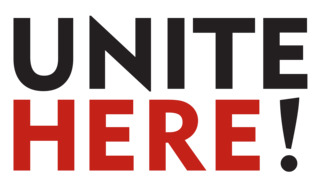
UNITE HERE is a labor union in the United States and Canada with roughly 300,000 active members. The union's members work predominantly in the hotel, food service, laundry, warehouse, and casino gaming industries. The union was formed in 2004 by the merger of Union of Needletrades, Industrial, and Textile Employees (UNITE) and Hotel Employees and Restaurant Employees Union (HERE).

John Francis Shelley was a U.S. politician. He served as the 35th mayor of San Francisco, from 1964 to 1968, the first Democrat elected to the office in 50 years, and the first in an unbroken line of Democratic mayors that lasts to the present. His tenure in the United States House of Representatives, immediately prior to his mayoralty (1949-1964), also broke a long streak of Republican House members and began a streak of Democratic representatives from San Francisco that continues to the present.

The 1934 West Coast waterfront strike lasted 83 days, and began on May 9, 1934, when longshoremen in every US West Coast port walked out. Organized by the International Longshoremen's Association (ILA), the strike peaked with the death of two workers on "Bloody Thursday" and the subsequent San Francisco General Strike, which stopped all work in the major port city for four days and led ultimately to the settlement of the West Coast Longshoremen's Strike.
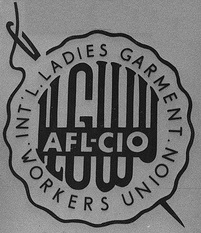
The International Ladies' Garment Workers' Union (ILGWU), whose members were employed in the women's clothing industry, was once one of the largest labor unions in the United States, one of the first US unions to have a primarily female membership, and a key player in the labor history of the 1920s and 1930s. The union, generally referred to as the "ILGWU" or the "ILG", merged with the Amalgamated Clothing and Textile Workers Union in the 1990s to form the Union of Needletrades, Industrial and Textile Employees (UNITE). UNITE merged with the Hotel Employees and Restaurant Employees Union (HERE) in 2004 to create a new union known as UNITE HERE. The two unions that formed UNITE in 1995 represented 250,000 workers between them, down from the ILGWU's peak membership of 450,000 in 1969.
Amalgamated Clothing Workers of America (ACWA) was a United States labor union known for its support for "social unionism" and progressive political causes. Led by Sidney Hillman for its first thirty years, it helped found the Congress of Industrial Organizations. It merged with the Textile Workers Union of America (TWUA) in 1976 to form the Amalgamated Clothing and Textile Workers Union (ACTWU), which merged with the International Ladies' Garment Workers' Union in 1995 to create the Union of Needletrades, Industrial and Textile Employees (UNITE). UNITE merged in 2004 with the Hotel Employees and Restaurant Employees Union (HERE) in 2004 to create a new union known as UNITE HERE. After a bitter internal dispute in 2009, the majority of the UNITE side of the union, along with some of the disgruntled HERE locals left UNITE HERE, and formed a new union named Workers United, led by former UNITE president Bruce Raynor.

Patrick Henry McCarthy, nicknamed "Pinhead", was an influential labor leader in San Francisco and the 29th Mayor of the City from 1910 to 1912. Born in County Limerick, Ireland, he apprenticed as a carpenter in Ireland before emigrating to the United States in 1880. He moved to San Francisco in 1886, where he rose through the ranks to become president of Carpenters Local 22, then President of the Building Trades Council in 1896. He was one the founder of the Japanese and Korean Exclusion League that 2 years later renamed into the Asiatic Exclusion League.
The following is a timeline of labor history, organizing & conflicts, from the early 1600s to present.
The Union Labor Party was a San Francisco, California working class political party of the first decade of the 20th century. The organization, which endorsed the doctrine of nativism, rose to prominence in both the labor movement and urban politics in the years after 1901, electing its nominee as Mayor of San Francisco in 1901, 1903, 1905, and 1909.
George Hardy was a Canadian-American labour leader who was president of the Service Employees International Union (SEIU) from 1971 to 1980. At the time of his death, SEIU had grown to become the fifth-largest affiliate of the AFL-CIO. Hardy was a vice president of the AFL-CIO from 1972 to 1980, and a member of its executive council. He was a former member of the Democratic National Committee and the California Democratic State Central Committee.
Citizens' Alliances were state and local anti-trade union organizations prominent in the United States of America during the first decade of the 20th century. The Citizen's Alliances were closely related to employers' associations but allowed participation of a broad range of sympathetic citizens in addition to those employers apt to be affected by strikes. Originating in the American state of Ohio as the "Modern Order of Bees," the Citizens' Alliance movement spread westwards, playing a particularly important role in labor relations in the states of Colorado and California. Citizens' Alliance groups often worked in tandem with smaller but better financed employers' organizations interested in establishing or maintaining open shop labor conditions, including the Mine Owners' Associations (MOA) or the National Association of Manufacturers (NAM).
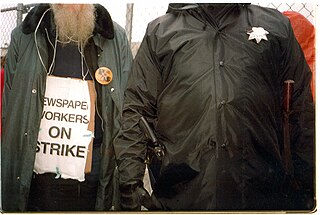
The San Francisco newspaper strike of 1994 was a labor dispute called by the Newspaper Guild in November 1994. Employees of San Francisco's two major daily newspapers, the San Francisco Chronicle and The San Francisco Examiner walked off the job for eleven days.
The Martin Luther King, Jr. County Labor Council (MLKCLC) is the central body of labor organizations in King County, Washington. The MLKCLC is affiliated with the national AFL–CIO, the central labor organization in the United States, which represents more than 13 million working people. Over 125 organizations are affiliated with the MLKCLC, and more than 75,000 workers belong to Council-affiliated organizations. In addition to supporting labor organizations, it acts as a voice for the interests and needs of the working people in King County, WA.
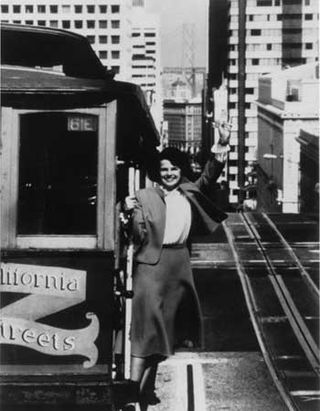
The mayoralty of Dianne Feinstein lasted from November 27, 1978, to January 8, 1988, while she served as the 38th Mayor of San Francisco. Feinstein gained the position following the Moscone–Milk assassinations, in which her predecessor, Mayor George Moscone, was killed by Dan White, a former member of the San Francisco Board of Supervisors. She was formally appointed to the position by the Board of Supervisors by a vote of six to two and inaugurated on December 4, 1978.

The International Longshore and Warehouse Union (ILWU) is a labor union which primarily represents dock workers on the West Coast of the United States, Hawaii, and in British Columbia, Canada; on the East Coast, the dominant union is the International Longshoremen's Association. The union was established in 1937 after the 1934 West Coast Waterfront Strike, a three-month-long strike that culminated in a four-day general strike in San Francisco, California, and the Bay Area. It disaffiliated from the AFL–CIO on August 30, 2013.
The Farah strike (1972–1974) was a labor strike by the employees of Farah Manufacturing Company, a clothing company in El Paso, Texas and New Mexico. The strike started at the Farah plant in San Antonio in 1972 when the Hispanic women, called Chicanas, led by Sylvia M. Trevino, at the company demanded a labor union formation to fight for better working conditions. The two-year long strike included 4,000 individuals, of which the majority were women.
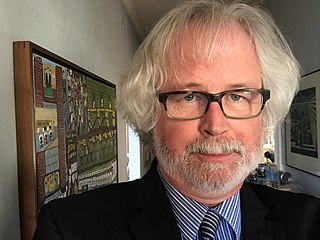
Timothy Dale Paulson is a California labor leader, who currently serves as the Secretary-Treasurer of the San Francisco Building and Construction Trades Council after being unanimously elected in July 2018, and sworn in by San Francisco Mayor London Breed.
The 2020 Alabama aluminum plant strike is a labor strike that occurred in Muscle Shoals, Alabama, United States from December 2020 to January 2021. The strike involved approximately 400 members of the United Steelworkers Local 200, over alleged unfair labor practices by Constellium, a multinational producer of aluminum products who operate a manufacturing plant.
References
- ↑ Damu, Jean (1981). "Economic Repression: The San Francisco Hotel Workers Strike". The Black Scholar. 12 (1): 68–71. ISSN 0006-4246.
- ↑ "Talks Continuing in Hotel Strike". The New York Times. 26 July 1980.
- ↑ "Radical ousted". The Desert Sun . August 8, 1980. p. 3. Archived from the original on December 9, 2020. Retrieved December 12, 2020– via Newspapers.com.
- ↑ "Hotel workers back on jobs". The Modesto Bee . August 16, 1980. p. 13. Archived from the original on December 9, 2020. Retrieved December 12, 2020– via Newspapers.com.
- ↑ Abate, Tommie (October 1, 2004). "Strife mirrors earlier strike / Hotel workers walked out in 1980 for four weeks".